Sights and Activities
Below are the places we saw and activities completed while visiting the Philippines:
Bohol
Tarsier Sanctuary: we were able to see these nocturnal primates during the day, most of the time they were sleeping. The tarsiers are one of the world’s smallest primates.


Chocolate Hills: these hills consist of over 1,200 conical hills, up to 120m high. They were supposedly formed over time by the uplift of coral deposits and the effects of rainwater and erosion. In the dry season they turn a brownish color, therefore chocolate.
Hanging Bridge: we crossed over two long hanging bridges made of bamboo
Floating Restaurant: had lunch on a floating boat on the Loboc River with, of course, live Filipino music.

Baclayon Church: 2nd oldest catholic church in the Philippines
Alona Beach on Panglao Island: had dinner on the beach and went for a short swim the next morning

Cebu
Basilica del Santo Niño: we visited the church on Sunday when mass takes place every hour and hundreds of people attend. The church gets so crowded that the mass takes place outdoors where there is stadium-like seating and people inside the basilica see the sermon in large screen televisions.
Fort San Pedro: this is the oldest Spanish fort built in the Philippines by Miguel Legaspi in 1565.


Magellan’s Cross: this is the first catholic cross in the Philippines brought by Magellan and the Spaniards in 1521
Colon St: we walked along Philippine’s first street
Tabo-An Market: an open air market specializing in dried fish
Mactan Shrine: site where Chief Lapu-Lapu killed Magellan 1521
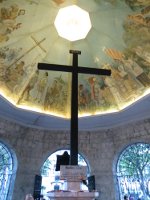
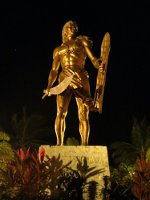
Legaspi
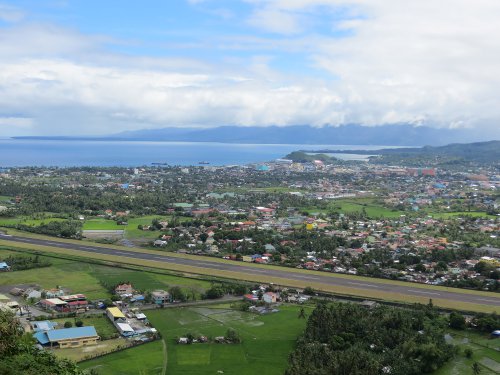
Lignon Hill: hiked up this hill to get a view of Mayon Volcano. Due to the clouds we were only able to see three-quarters of the massive mountain.
Cagsawa Ruins: saw the remaining ruins of a church built in 1724 and destroyed by the eruption of the Mayon Volcano in 1814

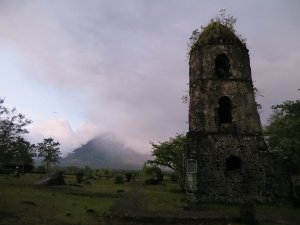
Donsol: went to this city in search of whale sharks, but after a three hour boat trip we saw no signs of them
Ogod River: took a night boat trip to view swarms of fire flies

Manila
Carlos Celdran Tour: a great tour of Intramuros and the history of the Philippines
Fort Santiago: another fort built by Miguel Legaspi in the 1590’s. José Rizal, the Philippines’ national hero, was imprisoned here before his execution in 1896.
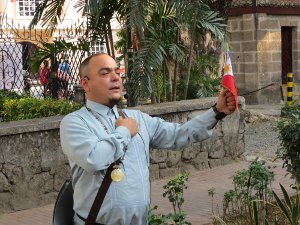

San Agustin Church: one of the few surviving structures of World War II
Makati Area: walked around the chic malls and restaurants
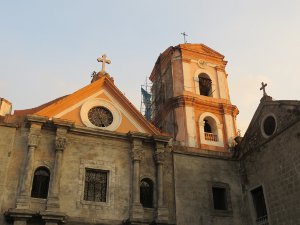
Banaue
Home of the Ifugao rice terraces, a UNESCO World Heritage.
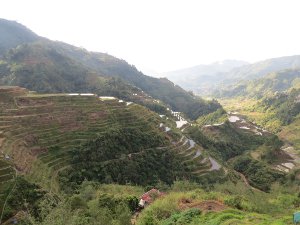
Batad
Hiked approximately one hour one-way to view this remote village on the foot of rice terraces.
Tappiya Waterfall: hiked about an additional two hours to view this 30 meter (98 foot) cascade
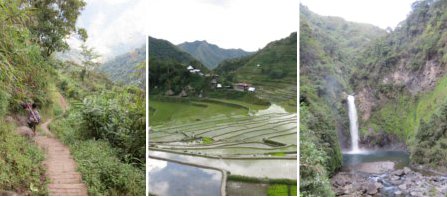
Sagada
Lumiang Cave: a burial cave used by the Igorot tribe. The tribe smokes the corpse to mummify it and put them inside coffins in a fetal or horizontal position. People buried in this cave are usually ill and placed her so that their “sickness won’t get out of the earth.”
Sumaging Cave: climbed down inside this deep cave with an underground river. The cave is full of beautiful limestone rock formations.
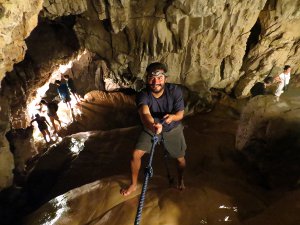

St. Mary the Virgin Cemetery: passed by a conventional cemetery on our way to view the hanging coffins
Hanging Coffins in Echo Valley: Igorots also hung coffins on cliffs under the belief that from there “they were able to still have a look over their descendants and be closer to heaven.” The last hanging coffin burial was in 2010.
Live Performances
The Philippines is known for their live entertainment and karaoke bars. Any popular bar or restaurant has some sort of live music and the best part, as one of our videos show, is that public participation is always encouraged. We were able to enjoy several performances during our visit.
Live Performance
Filipino Style
Karaoke
Modes of Transportation
Jeepney: old World War II jeeps converted into miniature buses
Tricycle: a passenger cabin attached to a motorcycle
Bus
Boat Ferry
Flight
Padyak: man-powered tricycle, a passenger cabin attached to a bicycle
Horse Carriage

